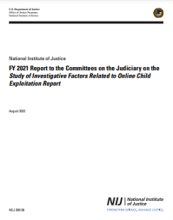Reports
Procedural justice, neighbourhood context, and domestic violence reporting intention among subgroups of immigrants
Campus Sexual Assault Responses (CSAR): Informing Trauma-Informed Policies, Protocols, and Training
Sexual violence is a significant criminal justice problem with long-term effects for its victims. In particular, sexual assault on or related to college campuses across the United States presents a growing public health and economic burden, starting with significant impacts on academic outcomes.
See the YouTube Terms of Service and Google Privacy Policy
Gender-Based Violence and the Latinx Community
See the YouTube Terms of Service and Google Privacy Policy
Economic Justice for Survivors of Intimate Partner Violence
See the YouTube Terms of Service and Google Privacy Policy
Evaluation of the Detection of Elder Mistreatment Through Emergency Care Technicians Project Screening Tool
A Low Cost All-Band All-Mode Radio for Public Safety: Phase I Technical Report
Exposing School Employee Sexual Abuse and Misconduct: Shedding Light on a Sensitive Issue
FY 2021 Report to the Committees on the Judiciary on the Study of Investigative Factors Related to Online Child Exploitation Report
The Role of Bullying-related Policies: Understanding How School Staff Respond to Bullying Situations
Tribal Crime, Justice, and Safety, Part 1
Research indicates that Native American persons experience crime victimization at higher rates than non-Native people. Furthermore, the unique position of American Indian and Alaska Native tribes as both sovereign nations and domestic dependents of the U.S. creates jurisdictional complexities in responding to crime, justice, and safety. Senior social and behavioral scientist Christine (Tina) Crossland discusses NIJ’s research on these topics, especially on the prevention of violence towards American Indians and Alaska Natives. Communications Assistant Stacy Lee Reynolds hosts.
Intervening in Gun Markets: An Experiment to Assess the Impact of Targeted Gun-Law Messaging
Employment Services for Ex-Offenders Field Test - Summary Report
Who is in the revolving door? Policy and practice implications of recurrent reports to adult protective services
Reports of Adverse Events Associated with Use of Novel Psychoactive Substances, 2017-2020: A Review
Do documented records and retrospective reports of childhood maltreatment similarly predict chronic inflammation?
Cannabinoid-based vaping products and supplement formulations reported by consumers to precipitate adverse effects
Cross-Validation of the Inventory of Callous-Unemotional Traits Across Reporters and Genders in a Sample of Detained Youth
Recent Advances in Comprehensive Chromatographic Analysis of Emerging Drugs
Evaluation of a Multi-Session Group Designed To Prevent Commercial Sexual Exploitation of Minors: The "My Life My Choice" Curriculum
FY 2021 Report to the Committees on Appropriations: Research on School Resource Officer Programs
Hate Crime and Hate Incidents in the Commonwealth, 2005
Social Competence Promotion With Inner-City and Suburban Young Adolescents: Effects on School Adjustment and Alcohol Use
Predictable Policing: Measuring the Crime Control Benefits of Hot Spots Policing at Bus Stops
Booker and Beyond Analyzing Sentencing Reform and Exploring New Research Directions
This webinar features a discussion of previously published research on the U.S. Supreme Court’s 2005 Booker decision - which effectively transformed the United States Sentencing Guidelines from a mandatory, to an advisory, system. The presentation will address selected research findings from the last 15 years. Individual participants will briefly review their previous research findings with particular attention paid to the analytic methods used.
See the YouTube Terms of Service and Google Privacy Policy






